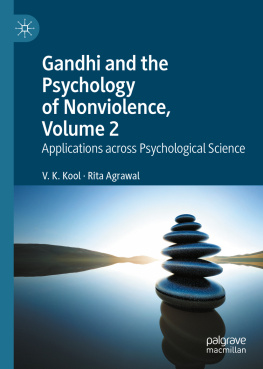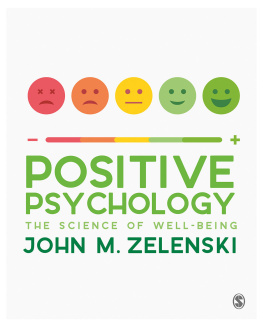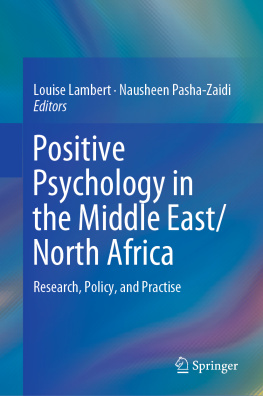Volume 15
Cross-Cultural Advancements in Positive Psychology
Series Editor
Antonella Delle Fave
University of Milano, Milano, Italy
The aim of the Cross Cultural Advancements in Positive Psychology book series is to spread a universal and culture-fair perspective on good life promotion. The series will advance a deeper understanding of the cross-cultural differences in well-being conceptualization. A deeper understanding can affect psychological theories, interventions and social policies in various domains, from health to education, from work to leisure. Books in the series will investigate such issues as enhanced mobility of people across nations, ethnic conflicts and the challenges faced by traditional communities due to the pervasive spreading of modernization trends. New instruments and models will be proposed to identify the crucial components of well-being in the process of acculturation. This series will also explore dimensions and components of happiness that are currently overlooked because happiness research is grounded in the Western tradition, and these dimensions do not belong to the Western cultural frame of mind and values.
More information about this series at http://www.springer.com/series/8420
Editor
Nausheen Pasha-Zaidi
Toward a Positive Psychology of Islam and Muslims
Spirituality, struggle, and social justice
1st ed. 2021

Logo of the publisher
Editor
Nausheen Pasha-Zaidi
Houston Community College and University of Houston Downtown, Houston, Texas, USA
ISSN 2210-5417 e-ISSN 2210-5425
Cross-Cultural Advancements in Positive Psychology
ISBN 978-3-030-72605-8 e-ISBN 978-3-030-72606-5
https://doi.org/10.1007/978-3-030-72606-5
The Editor(s) (if applicable) and The Author(s), under exclusive license to Springer Nature Switzerland AG 2021
This work is subject to copyright. All rights are solely and exclusively licensed by the Publisher, whether the whole or part of the material is concerned, specifically the rights of translation, reprinting, reuse of illustrations, recitation, broadcasting, reproduction on microfilms or in any other physical way, and transmission or information storage and retrieval, electronic adaptation, computer software, or by similar or dissimilar methodology now known or hereafter developed.
The use of general descriptive names, registered names, trademarks, service marks, etc. in this publication does not imply, even in the absence of a specific statement, that such names are exempt from the relevant protective laws and regulations and therefore free for general use.
The publisher, the authors and the editors are safe to assume that the advice and information in this book are believed to be true and accurate at the date of publication. Neither the publisher nor the authors or the editors give a warranty, expressed or implied, with respect to the material contained herein or for any errors or omissions that may have been made. The publisher remains neutral with regard to jurisdictional claims in published maps and institutional affiliations.
This Springer imprint is published by the registered company Springer Nature Switzerland AG
The registered company address is: Gewerbestrasse 11, 6330 Cham, Switzerland
Acknowledgments
This book could not have been completed without the help of numerous individuals who have contributed their thoughts and expertise. I am particularly grateful to the authors who were exceedingly patient with rewrites, suggestions, and questions as we navigated this process. I would also like to thank Annie Crookes, Saad Ibrahim Yaaqeib, Laila S. Dahan, Nasreen Shah, Mayyada Chami, Amber Haque, Ilija Gallego, Rabia Dasti, and Anisah Bagasra for serving as peer reviewers. Your comments, ideas, and editorial assistance were integral to the completion of this project. A special note of thanks goes to Meg A. Warren, Yvonne El Ashmawi, Neneh Kowai-Bell, Ali Al-Seheel, and Kate Bridges-Lyman for jumping in at the tail end of this project. Finally, I would like to acknowledge the deeper dive contributions of Guldan Esat, Imaani Din, Laila S. Dahan, and Rabia Dasti, whose work adds important nuance to the respective chapters in which they appear. I sincerely appreciate all of you!
Disclaimer
The information provided in this book is designed to provide helpful information on the subjects discussed. This book is not meant to be used, nor should it be used, to diagnose or treat any psychological, medical, or health condition. For diagnosis or treatment of any medical problem, consult a qualified professional.
The views and opinions expressed in this book are those of the author(s) and do not necessarily reflect the views and opinions of the editors, their academic institutions, sponsors, or publisher. Therefore, the publisher, editor, individual authors, and their organizations are not liable for any damages or negative consequences from any treatment, action, application, or preparation, to any person reading or following the information in this book. Any sponsors of the textbook are also exempt from any liability. References are provided for informational purposes only and do not constitute endorsement of any particular sources. Readers should be aware that the websites listed in this book may change.
While best efforts have been used in preparing this book, period updates and changes to the information may produce inconsistencies therein. In this event, every attempt shall be made by the editors to update the information in consequent publications.
Contents
Nausheen Pasha-Zaidi
Part I Journeys Toward Justice
Anisah Bagasra
Nasreen Shah , Munir Shah and Nausheen Pasha-Zaidi
Melissa Kerr Chiovenda
Iqra Iqbal and Nausheen Pasha-Zaidi
Part II Intersectional Identities
K. H. Tung
Tasneem Mandviwala
Maryam Khan
Part III Health and Healing
Syed Rizvi and Nausheen Pasha-Zaidi
Nausheen Pasha-Zaidi , Ali Al-Seheel , Kate Bridges-Lyman and Rabia Dasti
Nasreen Shah and Munir Shah
Part IV Acceptance and Allyship
Sarah Shah , Maryam Khan and Sara Abdel-Latif
Laila S. Dahan
Nausheen Pasha-Zaidi , Meg A. Warren , Yvonne El Ashmawi and Neneh Kowai-Bell
Part V Disrupting Dogma
Rabia Dasti , Aisha Sitwat and Amna Anwaar
Louise Lambert , Saad Ibrahim Yaaqeib , Annie Crookes , Brettjet Cody and Semma Saad
Beyhan Bozkurt and Nausheen Pasha-Zaidi
Mansoor H. Abidi
About the Editor
Nausheen Pasha-Zaidi
PhD, has worked with international and marginalized populations for over 20 years in the United States and the United Arab Emirates. She has degrees in communications, education, and psychology and has co-edited three books addressing international Muslim populations (Mirror on the Veil, CCC Press; An Introduction to Psychology in the Middle East (And Beyond), Cambridge Scholars; and Positive Psychology in the Middle East/North Africa















